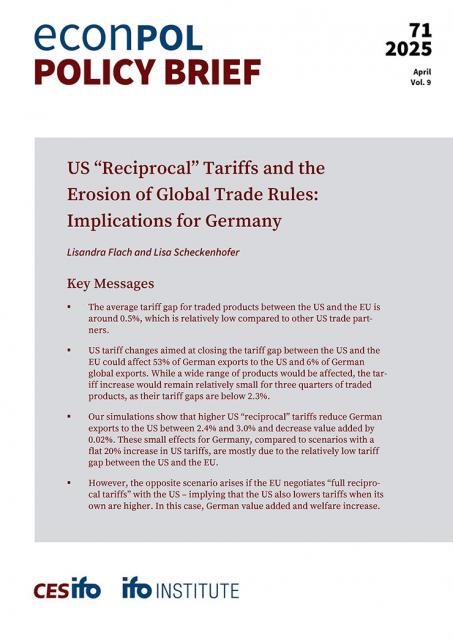News Archive

Effects of Policy Mix on European Regional Convergence
|
Working Paper
| News
The new EconPol Working Paper analyses the impact of the fiscal-monetary policy mix on the convergence on per capita income of the least developed regions (Objective 1) of the European Union (EU 28) during the implementation of the three European Structural and Investment Funds (ESIF) programmes between 2000 and 2020. The Solow-Swan growth model with control variables allows us to assess the absorption capacity of regions in the different phases of the economic cycle. The empirical results show the effectiveness of EU Regional and Cohesion Policy.

A Model To Think About Crypto-Assets and Central Bank Digital Currency
|
Policy Report
| News
The new EconPol Policy Report introduces digital assets, crypto assets in general, and Central Bank Digital Currency in particular, into an otherwise standard New-Keynesian closed economy model with Financial Frictions. This setting is used to study the impact of a change in preferences towards the use of digital assets and to address whether the emergence of this type of instruments affect the transmission of monetary policy shocks. In this context the paper analyzes the introduction of Central Bank Digital Currencies.

Investment Screening Mechanisms: The Trend to Control Inward Foreign Investment
|
Policy Report
| News
In an increasing number of sectors, concerns are rising that foreign firm participation may pose risks to public order. Many developed countries have adopted or extended their investment screening mechanisms to control inward foreign direct investment in strategically important sectors over the last years. This paper documents the development of investment screening in OECD and EU countries and provides the first discussion from an economic perspective. It reviews existing and propose new explanations for the adoption of investment screening.

The Recovery and Resilience Facility: A Springboard for a Renaissance of Public Investments in Europe?
|
Policy Brief
| News
The funds provided by the Recovery and Resilience Facility under the National Recovery Resilience Plans are supposed to finance new projects to supplement, not to supplant national efforts. This is also called additionality which has long been a key principle of the EU cohesion policy. According to this principle EU financial intervention should not substitute for national funding that would have been used in the absence of EU intervention. The purpose of this short contribution is to shed light on the additionality of public investments under the Recovery and Resilience Facility.

Fiscal and Current Account Imbalances: The Cases of Germany and Portugal
|
Working Paper
| News
This study’s aim is a comparative analysis between Portugal and Germany regarding the existence of a bidirectional relationship between the budget balance and the current account balance, starting with the introduction of the Euro (1999 and 2002, respectively) to the end of 2020. While the analysis finds a bilateral relationship, it shows that the budget balance and the current account balance for each country have similar and distinct developments, reflecting the distinct characteristics of each economy.
